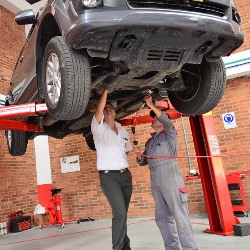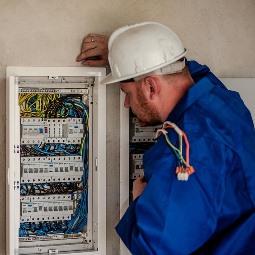How to Choose the Right Trade School Training near Clark Fork Idaho
 Deciding to begin a new profession and enroll in a vocational school near Clark Fork ID are serious decisions that will greatly affect your long term career. However with numerous vocational schools to pick from, exactly how do you approach locating the ideal one? Not only do you have to ascertain that you will obtain the complete training needed to be successful in your new field, but also that the school is reputable and well regarded. A number of prospective students make the error of selecting a trade school simply because the campus is closest to their home or place of employment. Others may be attracted to the school that charges the lowest tuition. Naturally the cost and location of the training are critical factors when evaluating vocational school options, but they should not be the sole ones. Additional factors including accreditation and the reputation of the schools are important as well. So prior to beginning your evaluations and comparing trade schools, you must know what questions you should be asking so you can get the information to make a final choice. We will review a few of those questions later in this article. But first, let’s talk about some of the vocation options that are available including the availability of online schools.
Deciding to begin a new profession and enroll in a vocational school near Clark Fork ID are serious decisions that will greatly affect your long term career. However with numerous vocational schools to pick from, exactly how do you approach locating the ideal one? Not only do you have to ascertain that you will obtain the complete training needed to be successful in your new field, but also that the school is reputable and well regarded. A number of prospective students make the error of selecting a trade school simply because the campus is closest to their home or place of employment. Others may be attracted to the school that charges the lowest tuition. Naturally the cost and location of the training are critical factors when evaluating vocational school options, but they should not be the sole ones. Additional factors including accreditation and the reputation of the schools are important as well. So prior to beginning your evaluations and comparing trade schools, you must know what questions you should be asking so you can get the information to make a final choice. We will review a few of those questions later in this article. But first, let’s talk about some of the vocation options that are available including the availability of online schools.
Trade School Training Options near Clark Fork ID
 There are an abundance of trades to choose from in vocational schools that offer fulfilling and high paying careers. Possibly you have already selected one that you have for years desired to pursue. For example, maybe you have always taken pleasure in working on your car and have thought about using that ability to make a living as an automotive tech. Or perhaps a member of the family has had a long and successful career in a certain trade or vocation and you would love to follow in his or her footsteps. No matter what your inspiration is for entering a trade, there is likely a program offered that will provide the training you require. Below is merely a modest representation of the vocational training programs that are available in the Clark Fork ID area.
There are an abundance of trades to choose from in vocational schools that offer fulfilling and high paying careers. Possibly you have already selected one that you have for years desired to pursue. For example, maybe you have always taken pleasure in working on your car and have thought about using that ability to make a living as an automotive tech. Or perhaps a member of the family has had a long and successful career in a certain trade or vocation and you would love to follow in his or her footsteps. No matter what your inspiration is for entering a trade, there is likely a program offered that will provide the training you require. Below is merely a modest representation of the vocational training programs that are available in the Clark Fork ID area.
- Automotive Technician
- Heating And Air Conditioning (HVAC) Tech
- Plumber
- Electrical Technician
- Welding
- Truck Driver
- Aircraft Maintenance Tech
- Lab Technician
- Construction Manager
Each of the programs will have differing costs and completion times based upon the trade, credential earned and school. Some of the programs may be completed in just weeks, while others will necessitate months or even two or more years of instruction. Each of these variables need to be considered prior to choosing a trade and a school.
Click Here to Get Free Information on Trade Schools Near You!
Learning a Vocation Online
 Trade Schools online have become more attractive with Clark Fork ID students and more and more accredited programs are being offered. Although learning online is a very convenient and accessible way to earn a certificate or degree, it might not be the ideal option for every vocation or trade. For instance, learning to drive a tractor trailer is not something that you can do online, nor is training how to weld. These are skills that have to be acquired through hands on training and by doing it, not by reading about it or watching videos. But certain aspects of the training can be appropriate for online classes, such as studying safety and driving guidelines for trucking schools or studying metallurgy or how to read blueprints for welder schools. A number of programs will combine online education with on-campus practical training, such as for electrician or welding schools. So it is essential to ask before enrolling in an online school for any trade if there is a suitable amount of hands-on training allocated to the course of study. One means to help establish est that a vocational school program is both appropriate for online education and provides comprehensive hands-on training is to verify that it’s accredited by a nationally recognized accrediting agency (more on accreditation later). For those vocations that are suitable for training online, it can be a convenient way for students with limited time to learn a new trade.
Trade Schools online have become more attractive with Clark Fork ID students and more and more accredited programs are being offered. Although learning online is a very convenient and accessible way to earn a certificate or degree, it might not be the ideal option for every vocation or trade. For instance, learning to drive a tractor trailer is not something that you can do online, nor is training how to weld. These are skills that have to be acquired through hands on training and by doing it, not by reading about it or watching videos. But certain aspects of the training can be appropriate for online classes, such as studying safety and driving guidelines for trucking schools or studying metallurgy or how to read blueprints for welder schools. A number of programs will combine online education with on-campus practical training, such as for electrician or welding schools. So it is essential to ask before enrolling in an online school for any trade if there is a suitable amount of hands-on training allocated to the course of study. One means to help establish est that a vocational school program is both appropriate for online education and provides comprehensive hands-on training is to verify that it’s accredited by a nationally recognized accrediting agency (more on accreditation later). For those vocations that are suitable for training online, it can be a convenient way for students with limited time to learn a new trade.
Questions to Ask Vocational School Programs
 After you have selected the trade and type of degree or certificate that you would like to obtain, either online or on campus, you can start to narrow down your selection of schools. As you are certainly aware, there are numerous trade schools in the Clark Fork ID area and across the Country to pick from. That’s why it is imperative to have a list of relevant qualifications when making school evaluations. As previously stated in our opening paragraph, tuition and location will undoubtedly be the initial two aspects you will consider. Following are several additional ones that you should research before enrolling in your school of choice.
After you have selected the trade and type of degree or certificate that you would like to obtain, either online or on campus, you can start to narrow down your selection of schools. As you are certainly aware, there are numerous trade schools in the Clark Fork ID area and across the Country to pick from. That’s why it is imperative to have a list of relevant qualifications when making school evaluations. As previously stated in our opening paragraph, tuition and location will undoubtedly be the initial two aspects you will consider. Following are several additional ones that you should research before enrolling in your school of choice.
Accreditation. Many Clark Fork ID area technical programs have attained either a regional or a national accreditation. They may receive Institutional Accreditation, which involves the school’s programs overall, or Programmatic Accreditation, which pertains to a specific program, for example HVAC technology. Confirm that the program and school are accredited by a U.S. Department of Education recognized accrediting agency, for example the Accreditation Board for Engineering and Technology. Along with helping make certain that you obtain an excellent education, it may assist in acquiring financial aid or student loans, which are in many cases unavailable for non-accredited schools. Furthermore, many states require that the training course be accredited for it to qualify for licensing where applicable.
How Long in Operation? One indicator to help assess the quality of a vocational school near Clark Fork ID is how long it has been in business. A poorly reviewed or a fly by night school normally will not be in business very long, so longevity is a big plus. On the other hand, even the top schools had to start from their first day of training, so consider it as one of multiple qualifiers.
Completion Rates. Ask the trade schools you are reviewing what their completion rates are. The completion rate is the percentage of students who enroll in and finish the course. A lower completion rate might indicate that students were dissatisfied with the course and quit. It might also indicate that the teachers were not qualified to instruct the students. It’s similarly important that the schools have higher job placement rates. Older and/or more reputable schools may have a broader directory of alumni, which may result in more contacts for the school to use for their apprenticeship and job placement programs. A high job placement rate can not only validate that the school has a good reputation within the field, but additionally that it has the network of contacts to help grads acquire apprenticeships or jobs in the Clark Fork ID area.
Apprenticeship Programs. Numerous training programs are taught together with an internship or an apprenticeship program. Those participating technical and vocational programs will help place you in an apprenticeship program inside their network of contractors or labor unions. Check if the schools you are comparing have referring partnerships with Clark Fork ID area contractors in the trade. An apprenticeship not only offers a rewarding experience by furnishing practical training, but it also provides employment opportunities and helps to establish relationships in the area professional community.
Modern Facilities. Make certain that the school facilities and the equipment that you will be instructed on are up-to-date and what you will be using in the field. If you are already in an internship or an apprenticeship, consult with the tech you are working under regarding what you should be looking for. If not, ask a local Clark Fork ID company if they can provide some suggestions. Also bear in mind that unless you are willing to relocate, the school must be within driving distance of your home. Remember that if you decide to enroll in an out-of-state school, in addition to moving costs there can be higher tuition fees compared to in-state residents.
Smaller Classes. It’s desirable that you receive as much personalized training as possible, which can be challenging in larger classes. Ask if you can monitor a few of the classes so that you can observe how large they are and experience the interaction between students and instructors. Talk to several of the students and get their comments regarding class sizes and instruction. Last, talk with a few of the instructors and learn what their level of experience is in Idaho and what certifications or degrees they have earned.
Flexible Scheduling. Make sure that the class schedules for the programs you are reviewing are flexible enough to handle your needs. If you can only go to classes in the evening or on weekends near Clark Fork ID, check that the programs you are reviewing provide those choices. If you can only attend on a part-time basis, make certain that the school you select allows part-time enrollment. Also, find out what the policy is to make-up classes should you miss any due to work, illness or family responsibilities.
Technical Schools Clark Fork Idaho
 Finding the ideal trade school near Clark Fork ID is a crucial beginning toward a rewarding career in the vocation of your choice. As we have covered in this article, you need to select a vocational school and a certificate or degree program that are both accredited and have excellent reputations within the field. Other things to search for are lots of practical training and state-of-the-art facilities. You should check out each of the schools personally that you are most interested in to explore the campus and talk with both the faculty and current students. Attempt to get a feel for the quality of the instruction and the interaction between them. Additionally, inquire about scheduling options and whether night or weekend classes are available if needed. And don’t forget to ask about financial assistance and student loan options also. You initially came to this website because of your interest in Technical Schools and wanting more information on the topic Vocational Schools Careers List. However, if you ask the proper questions as we have outlined in our checklist for evaluating schools, you’ll be able to filter your options so that you can make an educated decision. With the proper training, hard work and commitment, you can eventually become a licensed professional in your chosen trade.
Finding the ideal trade school near Clark Fork ID is a crucial beginning toward a rewarding career in the vocation of your choice. As we have covered in this article, you need to select a vocational school and a certificate or degree program that are both accredited and have excellent reputations within the field. Other things to search for are lots of practical training and state-of-the-art facilities. You should check out each of the schools personally that you are most interested in to explore the campus and talk with both the faculty and current students. Attempt to get a feel for the quality of the instruction and the interaction between them. Additionally, inquire about scheduling options and whether night or weekend classes are available if needed. And don’t forget to ask about financial assistance and student loan options also. You initially came to this website because of your interest in Technical Schools and wanting more information on the topic Vocational Schools Careers List. However, if you ask the proper questions as we have outlined in our checklist for evaluating schools, you’ll be able to filter your options so that you can make an educated decision. With the proper training, hard work and commitment, you can eventually become a licensed professional in your chosen trade.
Other Idaho Hard Working Locations
Clark Fork, Idaho
Clark Fork is located at 48°8′50″N 116°10′42″W / 48.14722°N 116.17833°W / 48.14722; -116.17833 (48.147180, -116.178270),[5] at an elevation of 2,090 feet (637 m) above sea level. According to the United States Census Bureau, the city has a total area of 0.92 square miles (2.38 km2), all of it land.[6]
This climatic region is typified by large seasonal temperature differences, with warm to hot (and often humid) summers and cold (sometimes severely cold) winters. According to the Köppen Climate Classification system, Clark Fork has a humid continental climate, abbreviated "Dfb" on climate maps.[7]
As of the census[2] of 2010, there were 536 people, 260 households, and 138 families residing in the city. The population density was 582.6 inhabitants per square mile (224.9/km2). There were 308 housing units at an average density of 334.8 per square mile (129.3/km2). The racial makeup of the city was 95.5% White, 0.7% Native American, 0.6% Asian, 0.6% from other races, and 2.6% from two or more races. Hispanic or Latino of any race were 0.9% of the population.
